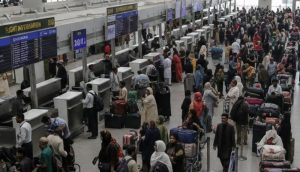TORONTO – The Canadian government is planning to send some of the migrants behind bars, triggering concerns from the rights groups.
The Justin Trudeau government is under pressure from the anti-immigration lobby to reduce the flow of migrants but the authorities seem to have taken a strong exception to such demands,
The federal budget presented by the government on Tuesday implies that the government wants to use federal prisons to detain migrants deemed “high-risk”.
“The government proposes to introduce amendments to the Corrections and Conditional Release Act and the Immigration and Refugee Protection Act to enable the use of federal correctional facilities for the purpose of high-risk immigration detention,” reads a para of the federal budget.
The line quoted above has sent shockwaves across the human rights organizations that believe that incarcerating people for immigration purposes violates their fundamental human rights and international law.
Besides the rights groups, two former federal Liberal ministers have also taken aim at the government for the proposal and believe that it does not align with the Liberal values of the country.
Responding to the critics, Immigration Minister Marc Miller has admitted that the proposal is under discussion but said those detainees will be separated from the prison population, though both groups could be sharing services.
“It would be separate housing and it would not be in the general population, because they are not criminals,” Miller said.
According to the immigration minister, the government had no choice but to use penitentiaries (a prison for people convicted of serious crimes) after provinces indicated that they would no longer detain migrants in their jails on behalf of the federal government.
Miller described those immigration detainees as “high-risk,” often with “severe mental health problems” and facing deportation orders.
The immigration minister said the government wants to “strike the proper notes of preserving the respect and dignity of the people that are being detained, but also keeping Canadians safe.”
“It’s a very small segment of the population,” he added.














